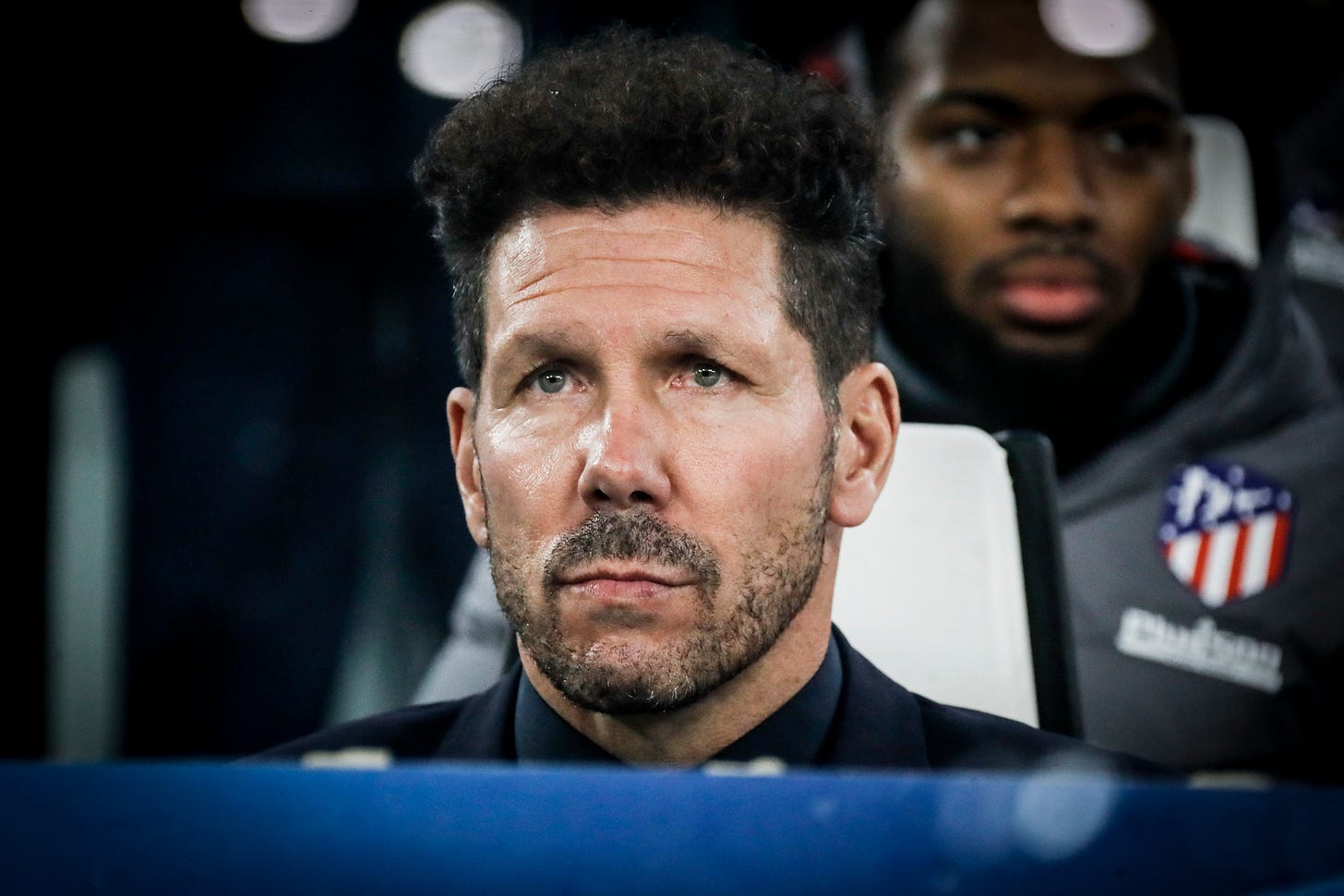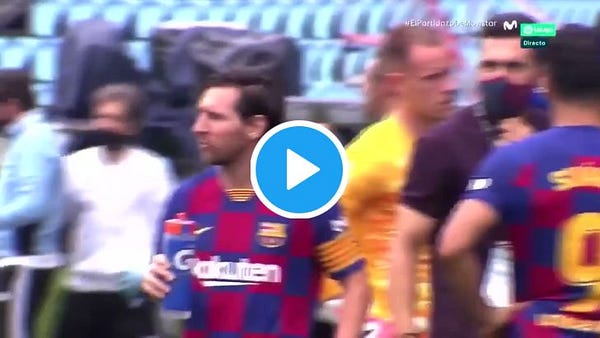What do Barcelona and Atlético stand for?
Six years on from Atleti's miraculous title win, Simeone's side have learnt to adapt while Barça haven't

Six years ago, Atlético Madrid were 1-0 down at the Camp Nou in the 49th minute when Gabi swung in a corner and Diego Godín crashed a header past José Manuel Pinto in the Barcelona net. The defender spun away and grabbed his shirt, his teammates mobbing him in front of a sea of Barça fans. The 1-1 draw was Diego Simeone’s finest moment in charge of Atleti, delivering a first league title in 18 years and breaking the 10-year duopoly between Real Madrid and Barcelona.
It is hard to pinpoint when Barcelona’s decline was set in motion, but Godín’s towering header is a good place to start. Tata Martino’s side losing the league in their own backyard to an aggressive, counterattacking team built on two banks of four seemed to confirm a wider trend across football which continued with Spain’s elimination in the group stages of the World Cup that summer. The possession-based football inspired by Pep Guardiola’s all-conquering Barça side had been overtaken by pressing and counter-pressing. Barça would have to adapt to football’s new reality to succeed.
So their clash with Atlético on Tuesday night was always likely to hold wider significance, even if a lot has changed for both sides since that remarkable conclusion to the season six years ago. For a start, Godín is long gone at Atlético, along with eight other members of that starting XI. Diego Costa and Koke are the sole survivors from the triumph at the Camp Nou, the Brazilian-born Spanish striker having returned a different player after his three-year detour at Chelsea.
Off the pitch, the symbolism of the Vicente Calderón’s one remaining stand awaiting demolition has been lost on no-one. Atlético’s move from their beloved former home to the shiny 70,000-seater Wanda Metropolitano stadium 12 kilometres out of town three years ago coincided with their transition to a superclub more akin to cross-city rivals Real. The turning point came with the €70million signing of Joao Felix last summer, a galáctico transfer which seemed to contradict the ‘people’s club’ tag that distinguishes them from Los Blancos.


As for Barcelona, their identity crisis has stretched on for the best part of a decade. Despite winning four of the last five La Liga titles, question marks remain over the style in which they have done it. Even when the MSN trio of Lionel Messi, Luis Suárez and Neymar were tearing through defences en route to winning a historic treble, some fans were still unhappy about what was happening to Barça’s philosophy.
Luis Enrique was the manager responsible for that success but he eventually left after being worn out by the demands of the job. Ernesto Valverde replaced him and was similarly accused of tinkering too much with the fabled 4-3-3 formation. Back-to-back league titles couldn’t save him after capitulations in Rome and Liverpool and he was sacked in January with the team top of La Liga. At which point enter Quique Setién, whose appointment was intended to appease those disgruntled Barça fans who felt the club had strayed too far from their possession-based ideals.
In fairness, it is not Setién’s fault that he has a threadbare squad after years of poor planning from Josep María Bartomeu and the rest of the board. It is not his fault that the dressing room holds a disproportionate amount of power and that Messi and Suárez seemed to ignore him during the 2-2 draw at Celta Vigo. And it is not his fault that players such as Arturo Vidal and Ivan Rakitic are playing in an uncertain situation when they know the club may well sell them in the summer just to balance the books, even with the bizarre Arthur-Miralem Pjanic swap deal brokered with Juventus.
But the manager does have something to do with the way his team play, and based on last night’s evidence Barça are no closer to that mythical style than they were when Valverde left earlier this year. Their attacking play was stodgy and much of their inspiration came from the electric 20-year old Riqui Puig, whose profile as a diminutive midfielder from La Masia was always likely to make him Barça’s next great hope. They are also further away from the title, a second 2-2 draw in four days representing more dropped points in the race with Madrid.
By contrast, this was another point which cemented Atlético’s hold on third place. They are a changed side, and that showed in the two equalisers from the penalty spot. Both were created by driving runs into the box by Yannick Carrasco, even if the second was a dubious call. Simeone’s team are still direct but in a different way, often attacking with four or five players deep in opposition territory. This was as expansive as they had ever been under Simeone and went some way to explaining why they are top of what AS call the ‘post-pandemic table’ with 12 goals in six games.
Two images summed up the game. One was the sight of €120million signing Antoine Griezmann tracking back to reclaim the ball from Thomas Lemar after being sent on after 90 minutes. It was the kind of diligence that would have made his old Atleti manager proud but which is part of the reason why he doesn’t fit in to Barça’s strict 4-3-3. The responses from Simeone and Setién after the game were instructive: the former refused to comment, while the latter said Griezmann’s presence “destabilised the team”.
Just as revealing was the picture contrasting Atlético’s team huddle with Barcelona’s disorganised rabble during the drinks break. Simeone’s side still stand for something all these years later; apart from institutional chaos, the same cannot be said for Barça.
Pick of the next three days — Valencia vs Athletic Club, Wednesday 18.30 BST
Voro is back at the helm for his sixth spell as interim boss of Valencia after another whirlwind week for Los Che. Albert Celades was sacked on Saturday following one win in the five games after the break and sporting director Cesar Sánchez went with him after reportedly telling the squad that the manager would keep his job, only to be embarrassed by the club’s owner Peter Lim. Both of these sides have European ambitions and Athletic are just one point behind Valencia. If nothing else, it will be interesting to see whether the ‘new manager bounce’ still applies for Voro. Sixth time lucky?
Image: Cristiano Barni via Shutterstock






